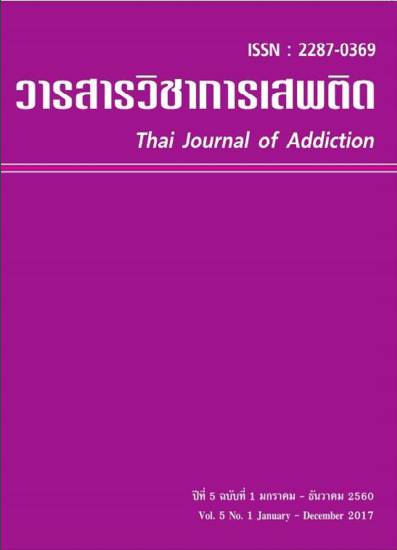The Effect of Cognitive Behavior Therapy on Relapse Prevention of Methamphetamine dependence among In-patients
Keywords:
Cognitive-behavioral therapy, methamphetamine-dependent patient, Rehabilitation, Drug AddictionAbstract
This research was designed as Quasi – experimental design (Two group pretest – posttest). The purposes of this study were compared intention and
self-efficacy to early relapse prevention of methamphetamine-dependent patients in rehabilitation phase between the group receiving cognitive behavioral therapy program with regular therapy program and group receiving regular therapy program. The participants consisted of 57 methamphetamine-dependent patients who were admitted in rehabilitation phase at Thanyarak Institute. The patients were randomly assigned into experimental and control groups. There were 29 patients in experimental group, and 28 in control group. The patients in experimental received 10 times of cognitive-behavioral therapy program which was developed by researcher. The instruments in the study were questionnaires comprising intention to early relapse prevention and self-efficacy to early relapse prevention. The data were analyzed by utilizing independent T-test
The result found that :
The experimental groups had more intention to early relapse prevention than control groups. However self-efficacy to early relapse prevention of experimental group and control group was not statistically different.
References
2. สำนักงานบริหารสาธารณสุข กระทรวงสาธารณสุข. (2554). รายงานผู้ป่วยยาเสพติด (บสต).
[สืบค้น 28 สิงหาคม 2556]. เข้าถึงได้จาก http://antidrug.moph.go.th/beta2/
3. ธงชัย อุ่นเอกลาภ. การบำบัดรักษาผู้ติดยาและสารเสพติดแบบผู้ป่วยนอก. กรุงเทพฯ:
โรงพิมพ์ชุมนุมสหกรณ์การเกษตรแห่งประเทศไทย; 2541.
4. สถาบันธัญญารักษ์. รายงานประจำปี 2550. สถาบันธัญญารักษ์. ปทุมธานี; 2550.
5. Beck, Aron T. et al. Cognitive Therapy of Substance Abuse. USA :
The Guilford Press; 1993.
6. Easton,C.J. et.al. A cognitive behavioral therapy for alcohol-dependent domestic violence offenders: an integrated substance abuse-domestic violence treatment approach (SADV). Am J Addict 2007. Jan-Feb;16(1):24-31
7. นิชนันท์ คำล้าน. การใช้กลุ่มบำบัดตามแนวคิดการปรับเปลี่ยนทางความคิดและพฤติกรรมในผู้ติด สุรา. ในการประชุมวิชาการสุขภาพจิตนานาชาติ ครั้งที่ 3 ปี 2547.
[สืบค้น 31 กรกฎาคม 2552]. เข้าถึงได้จาก http/www.jvkk.go.th/index01.asp.
8. Copeland, J. et al. A Randomized controlled trial of cognitive – behavioral interventions for cannabis use disorder. Journal of Substance Abuse Treatment 2001. 21;55-64.
9. ดรุณี ภู่ขาว. Development and evaluation of a culturally appropiate treatment program for people with alcohol use disorder in Thailand. (วิทยานิพนธ์ดุษฎีบัณฑิต) มหาวิทยาลัยควีนแลนด์; 2006.
10. สุกุมา แสงเดือนฉาย. ผลของโปรแกรมการบำบัดความคิดและพฤติกรรมร่วมกับแรงสนับสนุนทางสังคมที่มีต่อความพร้อมที่จะป้องกันการติดซ้ำและพฤติกรรมการไม่ติดซ้ำของผู้ป่วยสุรา. (ปริญญานิพนธ์วิทยานิพนธ์ดุษฎีบัณฑิต). กรุงเทพฯ: บัณฑิตวิทยาลัย มหาวิทยาลัยศรีนครินทรวิโรฒ; 2554.
11. Marlatt, Alan G. Taxonomy of High-risk Situations for Alcohol relapse : Evaluation and Development of a Cognitive-Behavioral model. Addiction 1996. 91
(supplement) : 37-49
12. Marlatt, Alan G.,Parks, A George & Witkiewitz, Katie. (2002). Clinical Guideline for Implementing Relapse Prevention Theory.[cited 2015 Jun5]. Available form : http://www.Bhn.org/guidline/RDT.
13. ปราณีพร บุญเรือง. ผลของกลุ่มปรับพฤติกรรมทางปัญญาของวัยรุ่นที่ติดยาบ้าต่อการป้องกันการกลับไปเสพซ้ำ. (วิทยานิพนธ์ พยาบาลศาสตรมหาบัณฑิต). ขอนแก่น: บัณฑิตวิทยาลัย มหาวิทยาขอนแก่น; 2545.
14. Miller; & Rollnick. Motivational Interviewing: helping people change. New York : Guilford; 2002.
15. Bandura A. (1986). Social Foundation of Thought and Action: A Social Cognitive Theory. Englewood Cliffs, New Jersy : Rentice-Hall; 1986.



